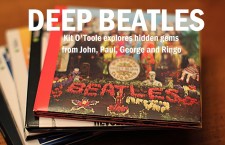Last week marked the 50th anniversary of a cultural revolution: the release of the Beatles’ Please Please Me. Their first effort, recorded over 12 hours on a single day, stands as one of the most impressive debuts in rock history.
Even more astonishing for a 1963 band, they included their own compositions besides covers; of course, the title track, “Love Me Do,” “I Saw Her Standing There,” and “Twist and Shout” are just a few examples of the Beatles’ early hits. Nevertheless Please Please Me contains some hidden gems as well, including the John Lennon/Paul McCartney-penned song “Misery.”
It represents their burgeoning talent for taking traditional subjects and turning them inside out, lending their own unique take on a love song.
“Misery” originates from the Beatles’ January 1963 tour with singer Helen Shapiro; in fact, they wrote the track with her in mind. “John and I were a songwriting team, and what songwriting teams did in those days was wrote for everyone,” McCartney said in 1988. “’Misery’ was for Helen Shapiro, and she turned it down. It may not have been that successful for her because it’s rather a downbeat song … It was quite pessimistic.”
According to the Beatles Bible, they began writing the track before the band’s performance at the King’s Hall, Stoke-on-Trent on January 26; later they completed the lyrics at McCartney’s family home in Liverpool.
In 1980, Lennon claimed that it was “kind of a John song more than a Paul song, but it was written together.” Interestingly, McCartney told biographer Barry Miles that “it was our first stab at a ballad and had a little spoken preface. It was co-written. I don’t think either of us dominated on that one. It was just a job. You could have called us hacks, hacking out a song for someone.”
After Shapiro rejected “Misery,” the duo offered the track to singer/actor Kenny Lynch, who was on the same tour. Lynch wound up scoring a minor hit with the single and, more importantly, ranks as the first artist to ever record a Lennon/McCartney original. (Lynch would later appear as one of the “escapees” on the Band on the Run album cover for Wings.)
The Beatles entered the recording studio on February 11, 1963, during which they would record an astonishing 10 songs. They performed 11 takes of “Misery”; as evidenced by the accompanying demos here, the takes varied little from one another. Breakdowns occurred because of flubbed lyrics, George Harrison’s difficult guitar part, and their increasingly rough voices. Producer George Martin recorded the track with the tape running at a faster speed — this allowed room for a later piano overdub, recorded at the slower speed.
On February 20, Martin laid down said piano part, and the day also marked the first time Geoff Emerick served as second tape operator. The Beatles were not present for this session. Further editing took place February 25, when Martin and engineer Norman Smith edited and remixed “Misery” as well as numerous other Please Please Me tracks.
To promote the album, the Beatles performed “Misery” frequently for the BBC. Curiously, the 1994 release Beatles Live at the BBC includes none of these performances, although they exist on a variety of bootlegs. Through much of 1963 they played the track live for BBC shows including “Saturday Club,” “On the Scene,” “Side by Side,” “Easy Beat,” and their own special, “Pop Go the Beatles.” The live BBC version below particularly showcases Ringo Starr’s pounding drums, Harrison’s guitar work (listen for the flair he lends to the song’s conclusion), and those tight Lennon/McCartney harmonies.
“Misery” is a noteworthy track in that it foreshadows their later experiments with expanding the limits of rock music and composition. When the piano and guitar start the song, they seemingly predict that this will be a tender ballad; as Lennon and McCartney croon the opening lines, they underscore the melancholy mood: “the world is treating me bad — misery.” Suddenly the bass kicks in, and Starr’s strong drumming drastically increases the tempo.
Thus, the tune becomes an oxymoron, with the upbeat instrumentation contrasting with the “lost love” theme: “I’m the kind of guy, who never used to cry. The world is treating me bad — misery.”
While the narrator is clearly mourning for his beloved, he manages to undercut his sadness with a touch of anger: “I’ll remember all the little things we’ve done. She’ll remember and she’ll miss her only one, lonely one,” they sing in the same key. By the end, however, the story is one of loneliness: “Send her back to me, ’cause everyone can see — without her I will be in misery.” Lennon and McCartney harmonize on the word “misery,” emphasizing the track’s overall theme.
But listen closely: the rapid tempo, chiming guitar, and cheerful vocal style all suggest that the Beatles are performing these rather depressing lyrics with a sly wink.
Are they parodying conventional ballads, or perhaps tweaking the rip-your-heart-out dramatics of Johnny Ray and other 1950s vocalists? It may have been the songwriting duo’s “first stab at a ballad,” as McCartney later said, but they seem to have absorbed the common characteristics of a teen love song, then turned those cliches inside out.
While the Beatles did not perform “Misery” on subsequent tours, it remains an early standout that previews the group’s groundbreaking creativity. Quite simply, a pop song doesn’t get much better than this.
- How John Lennon Came Roaring Back on the Beatles’ White Album - November 22, 2023
- Five ‘With the Beatles’ Deep Cuts That Illustrate Their Lasting Debt to R&B - November 20, 2023
- Five Must-Hear Deep Cuts from the Beatles’ ‘Past Masters’ - March 7, 2023


